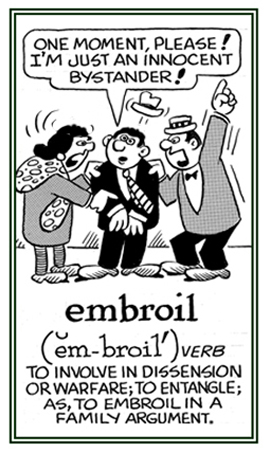en-, em-, el-
(Greek: in, into, inward; within; near, at; to put, to go into, or to cover with; as, entomb, encamp, enfold; to provide with; as, to enlighten; to cause to be; as, to enlarge; thoroughly; as, enmesh; in, within, into; as enzootic)
This prefix, en-, changes to em- before b, p, or ph.
disembark (verb), disembarks; disembarked; disembarking
1. To get off a passenger vehicle; especially, a ship, an aircraft, a bus, or a train: "The plane's crew members were the last ones to disembark after the passengers had disembarked."
2. To let passengers off a ship, bus, train, or aircraft, or to unload cargo from one of the forms of transportation: "The workers were busy disembarking the cargo from the ship."
2. To let passengers off a ship, bus, train, or aircraft, or to unload cargo from one of the forms of transportation: "The workers were busy disembarking the cargo from the ship."
1. An action that involves passengers and crew members getting off a ship or an aircraft.
2. A term used in the military to indicate an action aimed at landing personnel, usually via landing craft, to a shore with the purpose of taking action against another military power.
2. A term used in the military to indicate an action aimed at landing personnel, usually via landing craft, to a shore with the purpose of taking action against another military power.
embark (verb), embarks; embarked; embarking
1. To go on board, or to put or to take someone or something on board a ship or aircraft: Ted and his family embarked on a tour of Europe which lasted all summer.
2. To set out on a venture or to commence something; such as, to set out on an enterprise, subject of study, etc.: First, Shirley wanted to embark on her business career; after which, she planned to begin a world tour.
3. Etymology: from Middle French, the French of 1400 to 1600, embarquer, from em-, "in, into" + barque, "small ship".

© ALL rights are reserved.
Go to this Word A Day Revisited Index
2. To set out on a venture or to commence something; such as, to set out on an enterprise, subject of study, etc.: First, Shirley wanted to embark on her business career; after which, she planned to begin a world tour.
3. Etymology: from Middle French, the French of 1400 to 1600, embarquer, from em-, "in, into" + barque, "small ship".

Go to this Word A Day Revisited Index
so you can see more of Mickey Bach's cartoons.
1. The loading of troops with their supplies and equipment into ships or aircraft.
2. The act, process, or an instance of embarking; that is, having started something new or important: "The embarkation of the new project was initiated last month." 3. Engaging a person or investing money, etc. in an enterprise.
2. The act, process, or an instance of embarking; that is, having started something new or important: "The embarkation of the new project was initiated last month." 3. Engaging a person or investing money, etc. in an enterprise.
1. The act or the process of passengers and crew getting aboard a ship or an aircraft, etc.
2. The beginning of a journey.
3. Having engaged in or started an enterprise or project.
2. The beginning of a journey.
3. Having engaged in or started an enterprise or project.
embezzle (verb), embezzles; embezzled; embezzling
To fraudulently or illegally appropriate or take goods, or money, which is entrusted to a person for his or her personal use: "The banker was convicted of embezzling over $100,000 from his bank."
The act of taking money, property, etc. illegally from another person, a commercial enterprise, or government: "There apparently are more embezzlements going on than most of us ever imagined."
Anyone who misappropriates or steals money that has been placed in that person's trust or which belongs to an organization for which he or she works: "The embezzler, a high-ranking book keeper, was convicted of having transferred one million dollars from company funds over the past two years."
embitter (verb), embitters; embittered; embittering
1. To cause a person to be resentful or angry: When someone is fired from his or her job without a reason, it is enough to embitter anyone.
2. To exacerbate or to aggravate other people: To insult another individual will cause him or her to embitter the one who is making the abusive remarks.

© ALL rights are reserved.
Go to this Word A Day Revisited Index
2. To exacerbate or to aggravate other people: To insult another individual will cause him or her to embitter the one who is making the abusive remarks.

Go to this Word A Day Revisited Index
so you can see more of Mickey Bach's cartoons.
embrocate (EM bruh kayt") (verb), embrocates; embrocated; embrocating
1. To rub lotion or liniment on part of the body: Charles went to a physical therapist to ease the itching of his skin by getting it embrocated with a special solution.
2. Etymology: from Latin embrocare, "to treat with healing liquid"; from Greek embrokhe, "lotion".
2. Etymology: from Latin embrocare, "to treat with healing liquid"; from Greek embrokhe, "lotion".
A physical therapy that is done by the rubbing of a special fluid to a part of the body: The application of embrocation is usually done to relieve muscle or joint pains; however, other skin problems are also treated by this method.
embroil (verb), embroils; embroiled; embroiling
1. To involve a person, country, etc. in a quarrel, a conflict, or difficulties: Ted and Judy are embroiled in a divorce case because they have had constant arguments over the years since they have been married.
2. To complicate, to muddle or to confuse someone: The messed up pile of paid and unpaid bills on her desk embroiled Jane so much that she really had problems as to what she could do to solve them!

© ALL rights are reserved.

© ALL rights are reserved.
Go to this Word A Day Revisited Index
2. To complicate, to muddle or to confuse someone: The messed up pile of paid and unpaid bills on her desk embroiled Jane so much that she really had problems as to what she could do to solve them!


Go to this Word A Day Revisited Index
so you can see more of Mickey Bach's cartoons.
embryonic (adjective), more embryonic, most embryonic
Relating to an early or undeveloped project that is very new and is still evolving or advancing: Many car companies are in the embryonic stage of developing automobiles which would use electricity instead of gas or diesel fuels.

© ALL rights are reserved.
Go to this Word A Day Revisited Index


